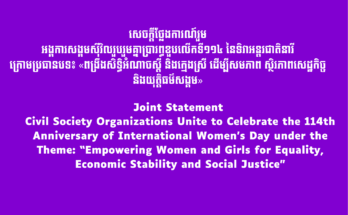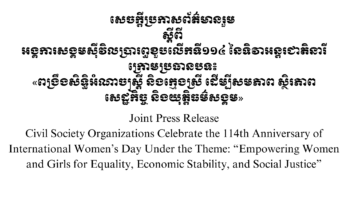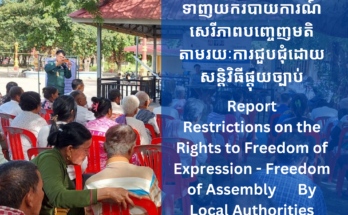Commentary: CHRAC / KAS / Cambodian Bar Association Workshop on the ECCC’s legacies
On March 12, the Cambodian Human Rights Action Committee (CHRAC), German political foundation Konrad-Adenauer-Stiftung (KAS) and the Bar Association of the Kingdom of Cambodia invited to a high-calibre Workshop on the ‘Implementation of the ECCC Legacies for Domestic Legal and Judicial Reform’. While the foreign panelists gave compelling and comprehensive reports regarding the status quo of the ECCC’s legacy, as well as regarding future possibilities within the legacy-phase, the Cambodian panelists provided valuable first-hand knowledge on the demand-side of the Judicial Reform.
They presented an all-encompassing account of what is, in their opinion, needed to facilitate the rule of law in Cambodia. However, as much as one was taken in by the interesting accounts on ‘how it is’ and ‘how it should and could be’, one could not miss the apparent elephant in the room. The legal community is quite aware of the status quo and they seem to know well what the rule of law has to be like. And, gathering from the reports on court offices without cupboards and judges without money for the everyday operations of their chamber, lack of financial resources seems to be an urgent problem.
Nevertheless, if one reads the reports of major donors in the realm of rule-of-law-advocacy, one can easily see that there is plenty of resignation about the little progress made resulting in an unwillingness to spend any more resources. But, as there is a huge base of knowledge and capacity at the ECCC, an awareness of what the proper rule of law should be like, and as much money has already been spent on the issue, what is amiss to facilitate a major improvement?
The answer could be found in the testimonies of the panelists, too. Alone, it was not as obvious as the reiterated demands for ‘monetary support’ and ‘free training’. All of the attendees seemed to know that some kind of ‘lack of knowledge’ or ‘lack of a certain behaviour’ is what makes Cambodia fall short of the rule of law. Money will facilitate nothing, as long as the admissions to the bar or the career of a judge is not dependent on his or her merits in the field of the law alone. But non-meritocratic modes of selection for offices can only hurt a nation as long as enough people are playing along. And money is not needed to plant the kernel of the rule of law. That can already be done today, when the Bar publishes a judicial review magazine online.
When lawyers stand up in court and demand their client’s rights to be obeyed instead of bargaining a solution. When legal scholars raise their voice not only in panels, but in newspapers, for the average Cambodian to hear. As the summary of the proceedings says, ‘commitment’, ‘courage and activism’ is ‘what we need’. What was dearly amiss at the panel, was a group of persons to stand up and start
changing things.
Henning Katzmann, Intern, KRT Project



